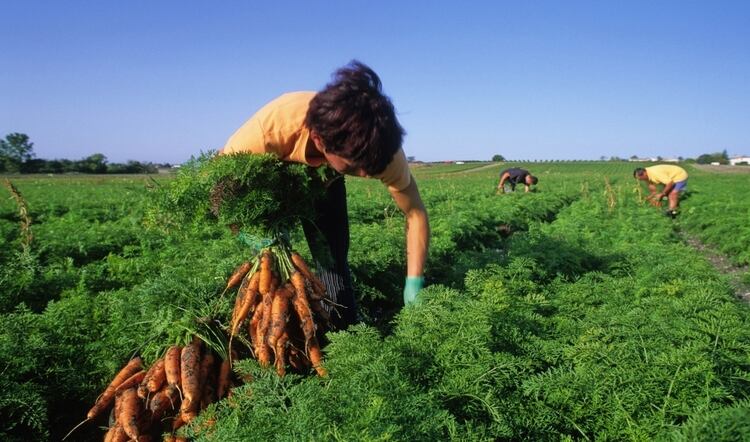"
The Government has launched a new points-based immigration system, which will take effect from 1 January 2021.
The policy, which will end free movement, will assign points for specific skills, qualifications, salaries or professions, and visas will only be awarded to those who gain enough points.
The Government said the new system would treat EU and non-EU citizens equally and would give top priority to those with the “highest skills and the greatest talents”, including scientists, engineers and academics.
The Government has confirmed there will be no specific route for low-skilled workers. However, its seasonal workers pilot will be expanded in time for the 2020 harvest from 2,500 to 10,000 places, responding to the specific temporary requirements of the agricultural sector, it said.
Home secretary Priti Patel said: “We’re ending free movement, taking back control of our borders and delivering on the people’s priorities by introducing a new UK points-based immigration system, which will bring overall migration numbers down.”
However, National Farmers Union president Minette Batters has expressed serious concerns about the Government’s failure to recognise British food and farming’s needs, as well as the short timeframe for implementation.
“As the UK’s largest manufacturing sector, British food and farming is at the very core of our economy and any immigration policy must deliver for its needs,” Batters said.
“We have said repeatedly that, for farm businesses, it is about having the full range of skills needed – from pickers and packers to meat processors and vets – if we are to continue to deliver high-quality, affordable food for the public. Failure to provide an entry route for these jobs will severely impact the farming sector.”
She added that while automation would have a “vital role” to play in the future, it was not a viable option to replace the number of people needed by farmers in the meantime.
Seasonal Workers Scheme
“Although the expansion of the Seasonal Workers Scheme will ease some of the pressure for the coming season, growers remain very concerned about how they will recruit vitally important seasonal workers in future,” she said.
“We are urging Government to commit to delivering a full scheme for 2021, which will enable us to recruit the 70,000 seasonal workers needed on British fruit, veg and flower farms. It is ironic that, on the one hand, the Government is encouraging more people to increase the amount of fruit and veg in diets, yet on the other hand making it harder for that fruit and veg to be produced in Britain.”
This view was backed by NFU Scotland that claimed that Scotland’s food and farming industries would be put at risk by the UK Government’s proposals.
It said it believed that the proposals would fail to provide enough options for seasonal and permanent non-UK workers to come and work in Scotland’s food and farming sectors.
President Andrew McCornick said it was becoming “increasingly clear” that the UK Government had disregarded the strong and consistent evidence of NFU Scotland and other businesses in the UK food and drink supply chain about the type of immigration system needed to ensure productivity and output.
“The proposals published will not provide sufficient options for non-UK workers to come and work in rural Scotland,” he said.
“As such, Scotland-specific work permits in a UK system should be considered as a means to offer businesses in Scotland flexible tools to attract and retain manual skilled individuals within our labour market, where automation and recruitment of domestic workers are not available nor viable options.”
Meanwhile, Unite assistant general secretary Diana Holland said: "Unfortunately, the government is still ignoring the pressing need to invest in labour market enforcement to ensure that workplaces and workers are safe, that the rate for the job is being paid, and that there are no unlawful deductions being made from pay packets.
“Workers be they in hospitality or agriculture will also be distressed to hear a government minister actively encourage employers to replace them with robots with no sense of the investment and time managing this change will take, and patients and their families will be concerned about what that means for social care and NHS patients.
“Migrant workers have contributed and do contribute greatly to our economy and country. Today’s proposals must not create hostility to these workers.”
Disappointing
Concerns on the Government’s policy were also raised by the British Retail Consortium (BRC).
“It is disappointing that the Government has not understood the needs of the economy and the vital contribution of workers supporting the operation of warehouses, food factories and city centre stores,” said Tom Ironside, director of business and regulation at the BRC. “When vacancies cannot be filled from the local labour market, businesses must be able to recruit from the widest talent pool available across all skill levels.”
Meanwhile, Carolyn Fairbairn, CBI director-general, said that getting the immigration system right would be critical for economic growth.
“Nonetheless, in some sectors, firms will be left wondering how they will recruit the people needed to run their businesses. With already low unemployment, firms in care, construction, hospitality, and food and drink could be most affected,” she added.
“A regularly reviewed shortage occupations list, with promises of further flexibility, will be vital for the effectiveness of the new system. Above all, the Government must work with employers and employees – especially smaller firms – to ensure they have the time to adapt to new policies and practices.”
Also, the Freight Transport Association (FTA) has called for the Government to reconsider the policy.
"As the only business group representing all of the logistics industry, FTA needs the Prime Minister, Boris Johnson, to reconsider his post-Brexit immigration policy immediately; the UK economy simply cannot operate without the logistics workforce," said Sally Gilson, head of skills policy at FTA.
"The sector is already facing a severe labour shortage – 64% of transport and storage businesses are now struggling to fill vacancies – and with EU workers currently constituting 13% of the entire logistics workforce, it is obvious how detrimental this policy will be on the very businesses charged with keeping the UK trading. If the government insists on withdrawing access to EU workers, it will have to adapt and adjust its allowances for training; the burden should not solely lie on UK businesses."
The UK Warehousing Association (UKWA) has warned that the logistics industry is likely to face a shortage of vital workers.
Peter Ward, ceo at UKWA, said: “‘Companies operating in the logistics and warehousing industry need access to low-skilled, low-cost labour and with low youth unemployment figures in the UK, the sector has traditionally looked to the EU to supplement its workforce."
The Scottish Association of Meat Wholesalers (SAMW) agreed.
It said: "The migration proposals raise a number of serious questions for SAMW member companies, given that EU nationals currently account for up to 75% of plant workforce. First and foremost we will need assurances that all existing plant staff will be allowed to remain in post under the new regulations. Without this our industry could very quickly grind to a halt.
"Even with such an assurance, however, member companies face a substantial challenge with many companies routinely coping with high levels of in-plant staff turnover, including our EU workers."
The immigration system proposed would mean that skilled workers would need to meet a number of relevant criteria, including specific skills and the ability to speak English, to be able to work in the UK. All applicants would be required to have a job offer and, the minimum salary threshold would be set at £25,600.




